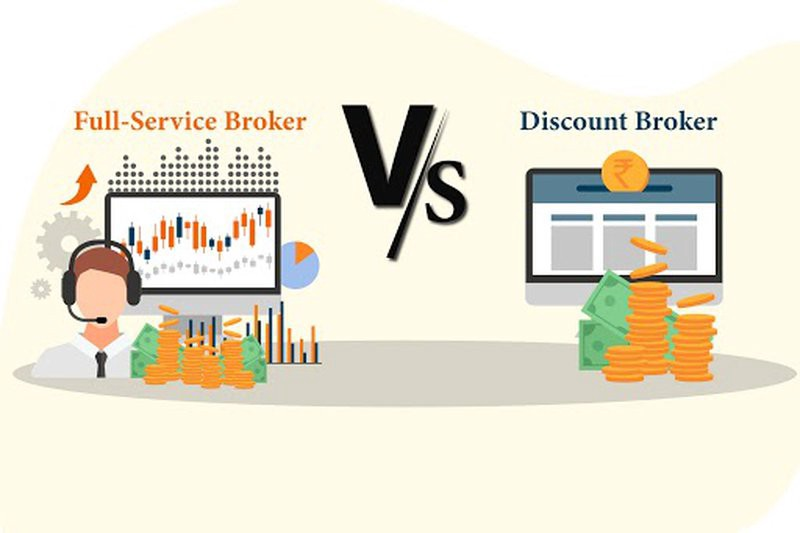Introduction
Before the last decade, the leading stock brokers were exclusively full-service firms. As the data show, however, most of the leading brokers now are bargain brokers that serve more than half of all investors. Can you not see that it is a major shift? During this time, the number of people actively investing has increased by 100%. In contrast, investors can choose discount brokers, offering trading platforms and free trading software. It's very similar to an investor-friendly self-service facility. Unlike discount brokers, full-service brokers offer more than simply a place to make trades; they also offer advice on a wide range of investment options. They provide links to informative resources, such as the advisories above.
Everyone who wants to invest in the stock market requires a Demat account; it's common knowledge. Moreover, a broker, also known as a "depository participant" or "DP," is the entity with whom a Demat account is established. There are three distinct brokerage firms: cheap brokers, banks, and those who provide full service to their clients. In terms of investment options, most brokers offer a comprehensive menu. Margin trading is another service they offer. In addition, they supply trading apps to ease the process of trading. Virtually every broker out there offers these conveniences.

Discount Brokers
A discount broker is an organization for those interested in online stock trading. One way to frame this is as a do-it-yourself opportunity for financiers. Discount brokers, despite their name, provide several advantages, including minimal commissions and trading costs and user-friendly online trading platforms. Although there is normally no advisor placing your orders at a cheap broker, many of them do provide educational tools and resources to help guide your investment.
Based on the principle of using technology to its greatest advantage, it gives investors access to first-rate resources at reasonable costs. One of the main selling points of these brokers is the cheap commission or brokerage fees they impose compared to more conventional options. Regardless of the trade size, they will charge you a fixed amount (as little as 20 euros in some situations), and there will be no further fees.
Full-Service Brokers
The brokerage firm handling your fully managed account can make trades at its discretion. People who are too busy or lack the interest to handle their finances benefit from this service. The high price tag is the biggest drawback of using a full-service brokerage. Even if the commission rates are lower than they used to be, using this service will still cost you significantly more each trade than using a cheap broker. Those who use such services typically have to pay a yearly charge calculated as a percentage of their overall assets.
The going rate for comprehensive services is about 2% per annum. A brokerage account with a $100,000 balance could incur annual administration fees. As their name implies, full-service brokers provide their clients with a wide range of services, resulting in a higher commission. Most of the time, their fees are calculated as a percentage of the total value of each deal. For every transaction of Rs. 1,00,000, you will be charged Rs. 300 as the brokerage fee, assuming the brokerage charge is 0.3%.
Choosing Between Full-Service and Discount Brokers
An investor's decision between a cheap broker and a full-service broker should be guided by their level of expertise in the market, investment objectives, and present financial situation. Some investors and traders prefer cheap broker products since they don't have to pay the high fees that can eat into their profits. Investors who want expert investment advice or need help with financial planning outside of investing should work with a full-service broker.
Investors and traders who frequently purchase and sell securities can benefit greatly from working with a discount broker. Investors who trade regularly can save money by using a cheap broker. Investors that don't need guidance, have tiny portfolios, or want their trades performed are also usually better off using bargain brokers.
Full-Service Vs. Discount Broker: Make The Smart Choice
The choice between a full-service and a bargain broker is an easy one for the majority of investors. The use of a discount broker is usually recommended. Considering the high cost of hiring a conventional full-service broker, you can see the clear financial benefit. As a bonus, you'll presumably learn some money management skills in the process of cutting costs.

Conclusion
A full-service broker is a good option if you don't have time to do your homework. A full-service broker is also a great option if you require an investment advisor to help you make smart decisions. On the other hand, a discount broker is an option if you'd rather not pay commissions to your broker. In sum, it's your money, so spend it carefully. You should always double-check the total cost after brokerage and taxes if you're an investor.




